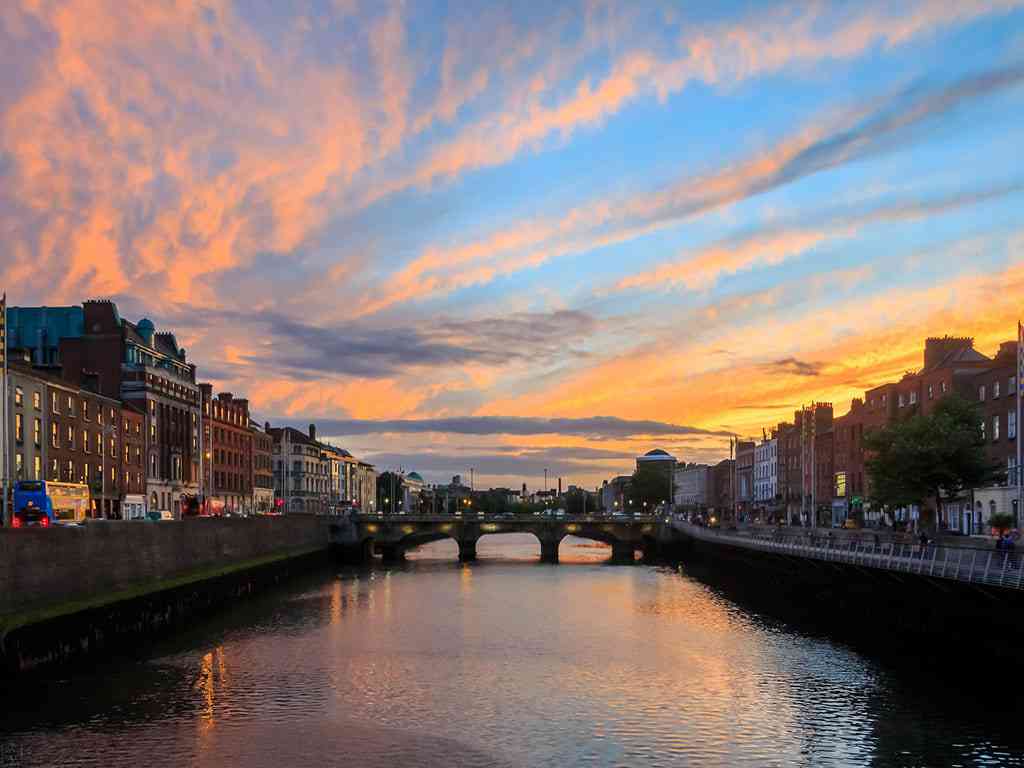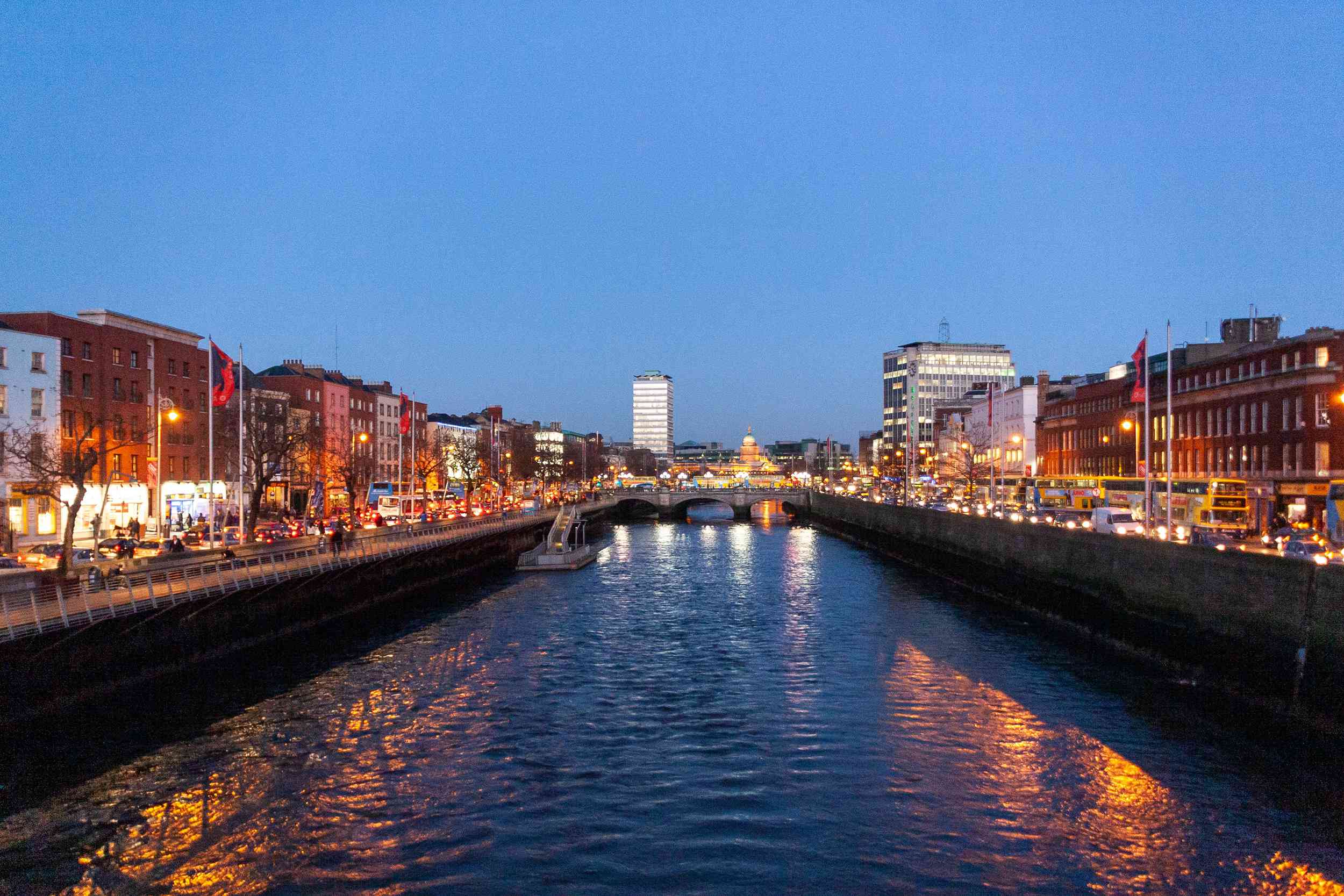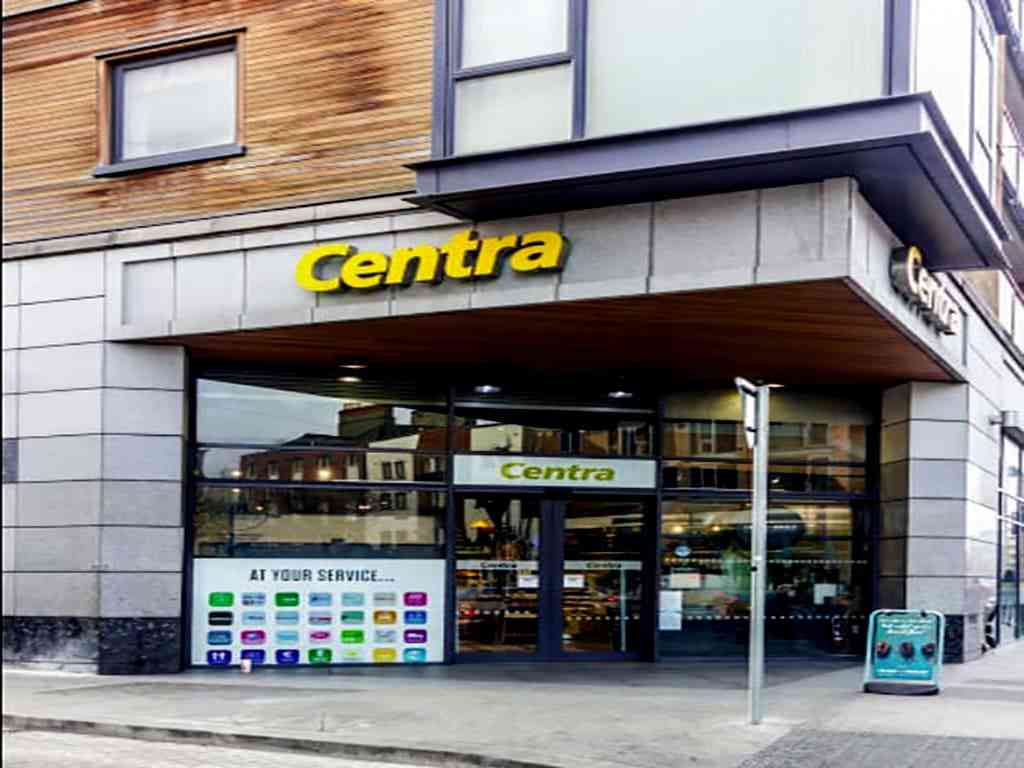Table of Contents
Can You Drink Tap Water in Dublin?
Yes, tap water is drinkable.
Tap Safe includes data from many publicly available sources, including the WHO (World Health Organization), CDC (Center for Disease Control), and user submitted databases, but unfortunately there's not enough data about Dublin.
To see user submitted ratings of the water quality for Ireland, see the "User Submitted Ratings" box on this page.
Dublin Tap Water
In the past, Dublin tap water did not present any significant problems. However, in recent years, there have been several high-profile cases where people have become ill and even became permanently disabled because of drinking contaminated tap water. The contamination usually occurs when people fail to make sure that they get a suitable filter for their tap. This is often because they are unaware of the existence of such a product.
The vast majority of tap water contains various types of contaminants. One of the most common ones is E Coli. It may be harmless to humans but can cause severe digestive issues if it gets into the intestines. Another common water contaminant is salmonella. While it is usually found in poultry meat, it can also be found in tap water and can cause infection to humans if they are repeatedly exposed.
Although most tap water will contain some level of these contaminants, they are usually so diluted that they are not very noticeable. If you are repeatedly exposed to contaminated tap water, this can slowly lead to different illnesses. If you feel that this may be the case in your home or that your children may be getting ill regularly, it would be wise to invest in a good tap filtration system that can get rid of the various contaminants found in tap water.
The tap water in Dublin, Ireland, is safe to drink. Drinking water is a scarce commodity vital to the City and the health of its citizens. Every day 540 million liters of high-quality drinking water is provided to 1.5 million customers in the Dublin Region. In general, the quality of the public drinking water supply remained high, according to the report of the Environmental Protection Agency (EPA). But continued investment to ensure the protection of supply was needed.

The record shows that 99.9% of public drinking water samples taken complied with microbiological standards. And 99.6% of samples complied with the chemical rules.
Generally, bigger towns like Dublin, you should feel secure to drink the tap water. But in rural areas, you may want to avoid ice cubes and stick to bottled water cautiously. Several hotels and restaurants throughout the country also have their water filter system that would make it safe to drink.
Dublin, Ireland, has some of the hardest water in the country.
Hard water is water with a mineral concentration of over 200 PPM mg/L. It would be deemed to have a high mineral content. There is a possibility that the effects of water hardness on your skin, hair, and appliances will vary depending on the levels of water hardness in your region.
Dublin Drinking Water
If you are an avid traveler, you will know how essential it is to filter your Dublin drinking water before consumption. In some cases, tourists have used dirty and unsafe tap water while visiting there. This should be done with such care and caution because most of the harmful contaminants present in tap water can prove to be very deadly for humans.
When you are traveling around Dublin and are stopping in various places on your way to the capital, you should ensure that you do not drink tap water, especially if you stay at a hotel where the taps are either unclean or not properly serviced. To safeguard yourself from the dangers of contaminated water, you should invest in a good tap water filter system to ensure that you do not become victim to waterborne diseases. If you take care of your health and ensure that you drink only clean water and make sure that your water is serviced regularly, you will be much safer than if you did not do them. You will also save yourself a great deal of money on health care costs when you become afflicted with a disease caused by drinking dirty water.
There are several different water filtration systems available in the market today that you can quickly get hold of. They vary in the cost of the products, and they are also classified according to their efficiency in cleaning your water. The systems you choose should remove all the microorganisms and contaminants present in your tap water and those present in the air, and those that come through your taps. A few products will even get rid of the traces of toxic metals such as lead from your water. It is a good idea to check out the reviews of different products to ensure that you are purchasing one of the best ones around.
Dublin Drinking Water Quality
Do you know how to check the quality of your drinking water in Dublin? This is one thing that I never got a chance to learn before my recent experience with a water filtration company. I stayed at a hotel on O’fercarmichael, a small estate on Dublin’s outskirts, a lovely little place located in the shadow of the Liffy Mills skyscrapers. My wife and I left our comfortable room at the hotel to visit an Irish coffee festival in the nearby Abbeygate Church. We were expecting a funfair filled with people having a great time sipping on their coffee and chatting with old friends. I can’t say that I got the same feeling from the festival, but I’m not complaining because I’m not a big coffee drinker!
We decided to walk to the Abbeygate Church, located next to a major shopping mall and a nice little cobbled street. Once we were near the church, we could see Mary and the cross’s large statue and decided to walk to the other end of the road where the coffee shop was. The water from the tap running was fine, but the water from the filter seemed to be a lot thicker than I would have expected and tasted strange. I saw that the guy running the machine said that the water quality was okay and that there had been no problems with any of the previous customers in the last few months. I guess it’s always best to check everything before you drink any tap water, but it didn’t seem like a big deal to me.
I left that visit with my senses open, but my stomach wasn’t. I went back the next day to make sure that the water I had tasted was what I thought it was and to find out if I had any other concerns. I went to the water filters and talked to some people who work there. They told me that this filter used a carbon-based filter which is the most common type used. They told me that the filter had been purchased specifically for this job only because the one used at the plant in Dublin, Ireland, doesn’t catch all of the contaminants found in this area’s drinking water.
Dublin Water Treatment
The use of Dublin water treatment is necessary for all individuals who reside in the Dublin Area. This is a fact because many people from other counties have come to Ireland and need to take advantage of the public water system that is provided for them. There are a lot of contaminants that are present in the groundwater of Dublin. Many microorganisms, chemical substances, and organic substances can be found in large quantities in this water supply. All these have harmful effects on the people, and they are therefore encouraged to get water treatment systems installed in their homes to make sure that they do not become sufferers of water-related diseases.
Water treatment involves the use of machines such as filters, clarifiers, and ozonation. The use of these machines is necessary since they enable you to get rid of your water’s impurities. If there are big impurities, then they will be removed by using filtration units. You could also buy bottled water from Dublin stores if you do not like to use the treated water. However, bottled water has no guarantees of being free from chemicals shipped through trucks from distant places.
If you want to be sure that the water you are taking in is good, you could install an Ozonator or a filter. These units are beneficial because they remove just about all contaminants and leave the essential minerals necessary for the human body intact. If you do not wish to spend too much on water purification machines, you could use filters. These filters are available at various places, and they are incredibly cheap.
Source of Water in Dublin, Ireland
The primary source of tap water supply for the Dublin Region is surface water. Water is abstracted from Poulaphuca lake and treated in Ballymore Eustace Water Treatment Plant. Treated water is then transmitted from Ballymore Eustace to Dublin. Of the water treatment plants, water runs by gravity into large pipes to service reservoirs. These give short-term storage to guarantee a constant water supply throughout peak demand periods. Levels in the reservoirs drop during the day when demand is high and rise by night during demand is low.
From the service reservoirs, water flows through a smaller pipe system (distribution mains) to the City’s homes, schools, and businesses. Most water flows by gravity. However, in some elevated areas, it is necessary to pump. Over two thousand kilometers of underground pipes carry the water in a web-like network through the City.
Another source of water comes from groundwater. Groundwater is vital as a source of drinking water, and it supports river flows, lake levels, and ecosystems. It contains natural substances dissolved from the soils and rocks. Human actions on the land surface can cause contamination. As a clean but vulnerable resource, groundwater needs to be managed and protected.
Dublin Water Supply
Suppose you’ve never actually used a water filtration device. In that case, you probably won’t know what you’re missing… the pleasure and health benefits that come with using the suitable purification method for your home water can’t be beaten. It’s easy to compare quality units in your local area by simply visiting one of many online retail stores that carry a wide variety of purification devices. Or better yet, ask your local doctor or water treatment provider for advice.
Dublin has a superb water supply as it has one of the most extensive water treatment systems in Europe. The River Lee delivers water to all parts of Dublin city and outlying areas, including Fahan and Swords. The river basin covers more than 5 square miles but only receives a fraction of that water amount. The rest travels through the city and the county of Galway. This vast water resource is often overfilled, leading to some of the rivers’ biological activity and the growth of bacteria and germs that can harm the general public.
To reduce this bacterial burden, the Department of Health requires that all domestic water suppliers meet strict annual maintenance requirements. The Environmental Protection Agency also regulates the number of chemicals used to treat the water for public consumption. It is estimated that Dublin’s public water supply will remain bacteria-free for the last 15 years by meeting these stringent requirements.
Dublin Bottled Water
Dublin is one of the most crowded cities in Europe today, with just over eight million. This has led to many people struggling for pure drinking water, and several companies have stepped forward, offering to supply it for free. However, it must be noted that some of these offer the service only on a limited basis and in selected areas. Others offer a “pay as you go” scheme where users can pay to avoid overpaying and the hassle of having to stock up on bottled water. However, the vast majority of these companies offer the service throughout the city.
One of the main problems with buying Irish bottled water is that you get what you pay for. The quality of many of the bottles sold here is inferior, and they do not make excellent drinking water. This means that you need to make sure you buy from companies you trust and check how old the bottles are, which can determine how good the water is. It is always best to go for brand-name products, but you should be aware that they are usually quite expensive.
When you go out shopping for your Irish Water of the Future, you will find that there are plenty of options available. These include traditional water bottles, filtered ones, and more. If you want to filter your water, you should look at the range of available units from various suppliers. You can use these to create your water filter and then save money on bottled water costs in the future.
Dublin Water Treatment Plants
Apart from getting the purified water, you can also benefit a lot from the treatment plants’ disinfection process. If you add some chlorine to the water during its treatment, it will kill any disease-bearing organisms present in the water. Also, it helps to make the water taste better because of the different disinfectants used to treat it. However, if you do not want to use this method, you can also install an ultraviolet light in your kitchen to destroy any bacteria present in the water.
In addition to the disinfectant methods mentioned above, there is another method that the treatment plants commonly use. This method is carbon filtration. As the name suggests, it removes the contaminants present in the water but does not remove any of the essential minerals present in the water. So, if you drink tap water regularly, it is advised that you buy carbon filters for your home. Apart from these, you can also buy bottled water for the same purpose. This way, you can ensure that you and your family stay healthy always.
Alternative links:
What do people in Dublin think about the tap water?
Don’t bother with bottled water in restaurants; Dublin’s tap water is perfectly safe, free and generally excellent.
FAQs about Dublin Water

The estimated price of bottled water
$1.72 in USD (1.5-liter)
USER SUBMITTED RATINGS
- Drinking Water Pollution and Inaccessibility
- Water Pollution
- Drinking Water Quality and Accessibility
- Water Quality
The above data is comprised of subjective, user submitted opinions about the water quality and pollution in Dublin, measured on a scale from 0% (lowest) to 100% (highest).
Related FAQS
Reminder
Always take extra precautions, the water may be safe to drink when it leaves the sewage treatment plant but it may pick up pollutants during its way to your tap. We advise that you ask locals or hotel staff about the water quality. Also, note that different cities have different water mineral contents.
Sources and Resources
Sources Cited
Additional Resources
Traveller's Notes
Don't bother with bottled water in restaurants; Dublin's tap water is perfectly safe, free and generally excellent.
Current Weather in Dublin
DUBLIN WEATHERSome of the Local Convenience Stores in Dublin

- Londis
- Centra
- Spar
- O'Dwyer's Daybreak
- QUIK PICK
- Extramart
- Aziz Newsagents
- Costcutter
- MACE
- Daybreak
- Camelot Store
- Paprika Store
- Maxol
- Gala
Estimated Price of Bottled Water
| Volume | EUR | USD | GBP |
| 1.5-liter | €1.29 | $1.42 | £1.16 |